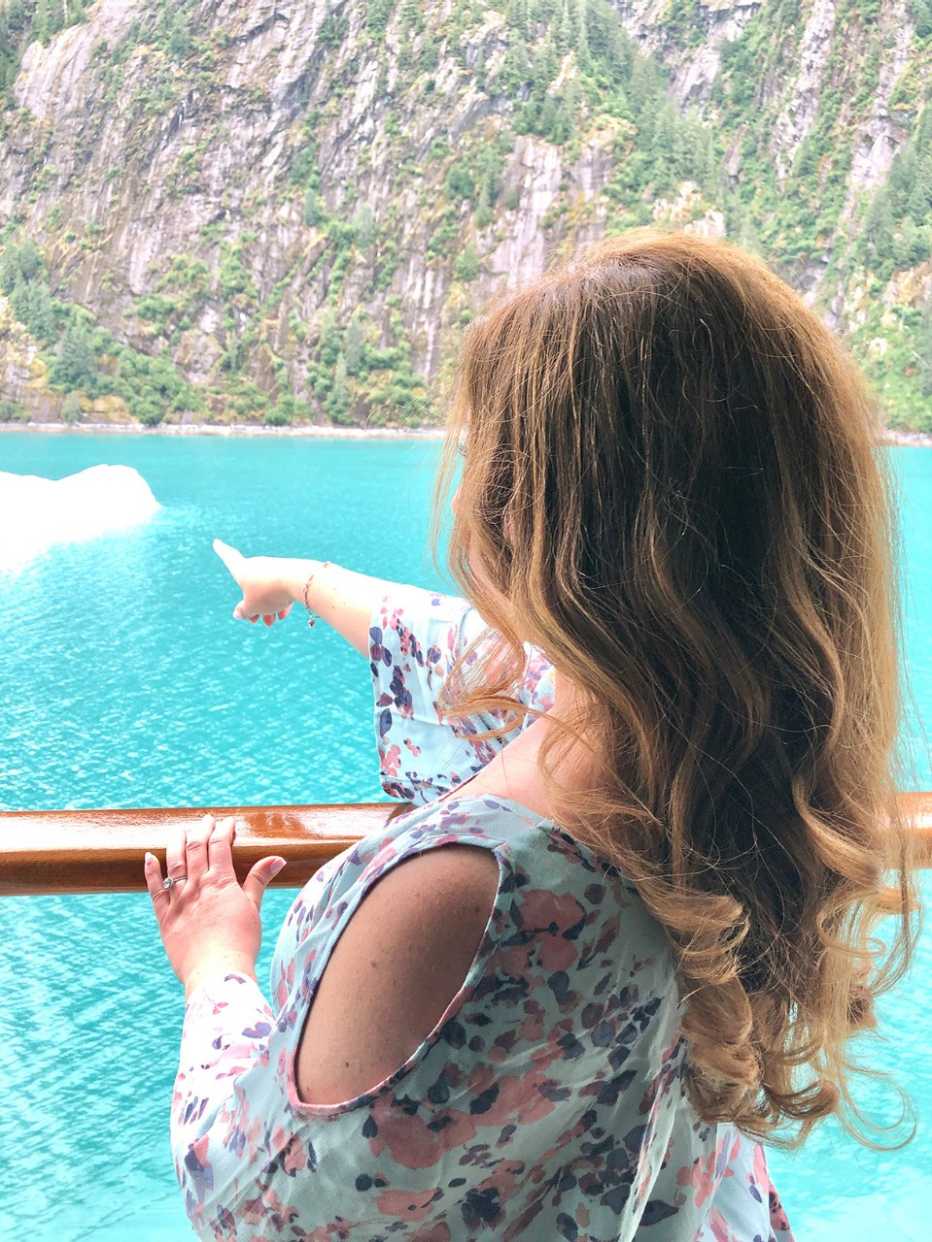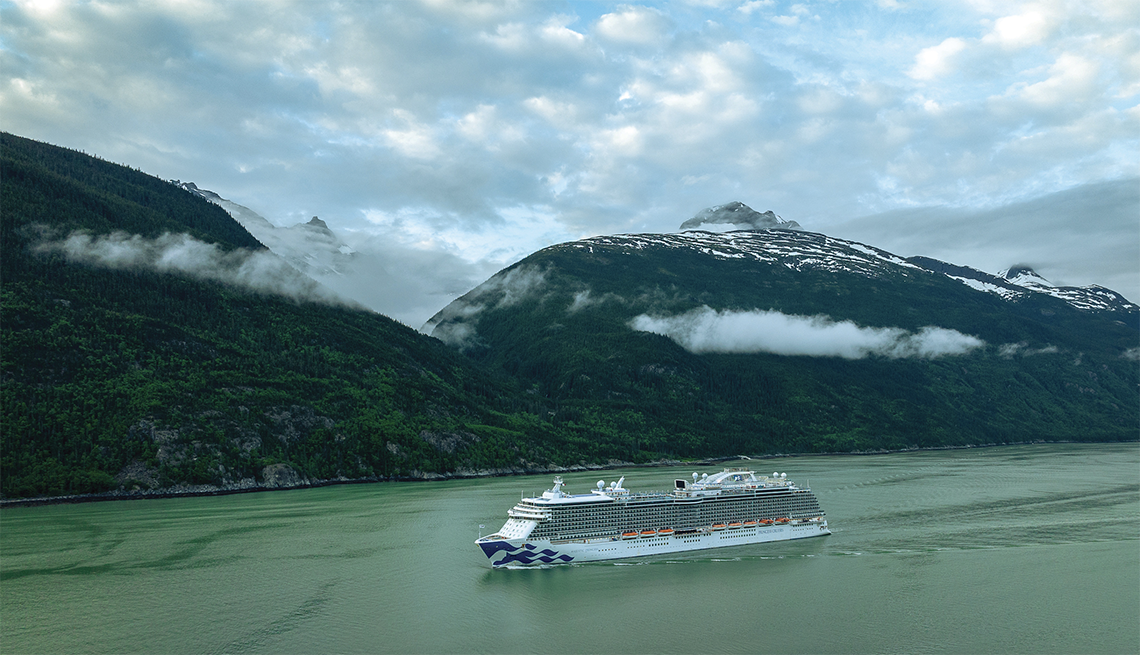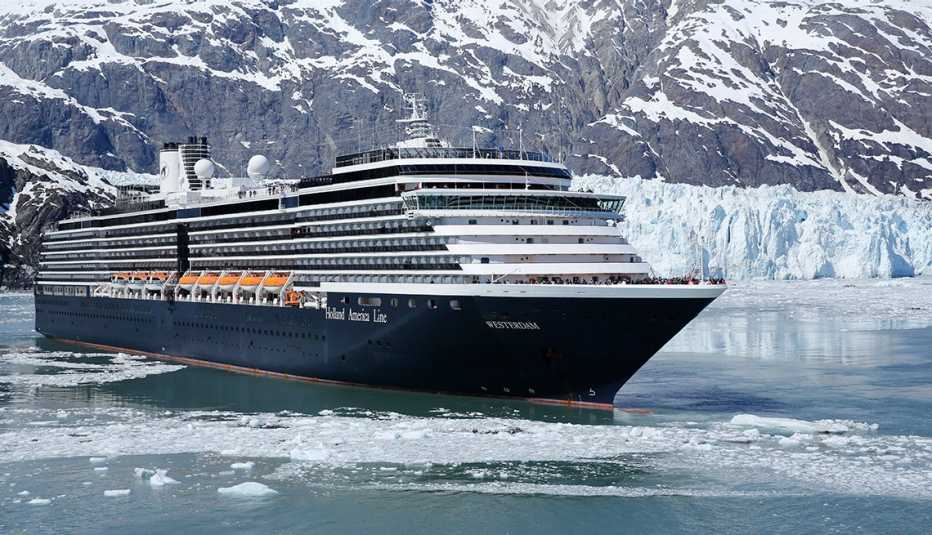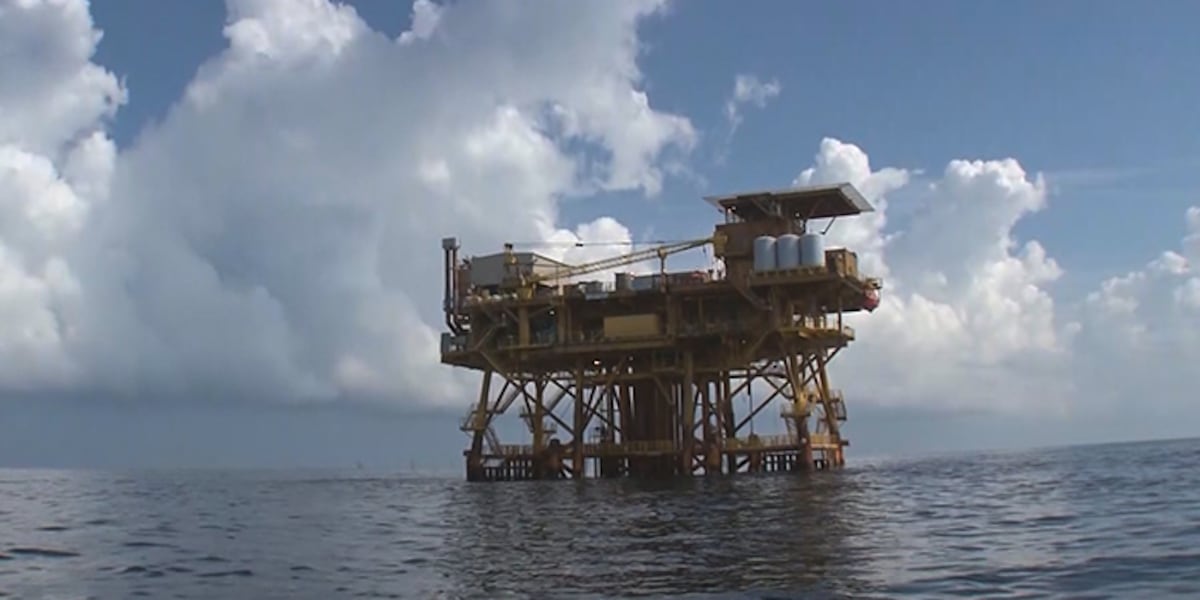
Jill Schildhouse enjoys the view from her balcony aboard the Windstar Star Legend.
Jill Schildhouse

Because Alaska’s cruise season is so short and demand is high — the projected count for 2023 is 1.65 million cruise travelers on 60 large and small ships sailing around 700 voyages, according to Cruise Lines International Association Alaska — prime cabins and itineraries can sell out six months in advance.
“If you want the best ship location and promotions, then book early,” says Reuling, noting she booked her upcoming Alaska cruise a year out. “As with all cruises, the most expensive and least expensive tend to sell out first.”

Jill Schildhouse enjoys the view from her balcony aboard the Windstar Star Legend.
Jill Schildhouse
Speaking of prime cabins, while you can easily get away with an inside or an ocean-view cabin on most cruises to save money, you’ll definitely want to splurge for a balcony in Alaska. Why? The vast majority of your route will be breathtakingly scenic, with nonstop opportunities to see whales and other marine life, chunks of ice, waterfalls, bald eagles and more. Your own private balcony (paired with a trusty set of binoculars) is always the best viewing spot on the ship. And with about 22 hours of daylight on cruises during the summer months, consider this round-the-clock viewing window your free excursion.
Small ship and big ship Alaska cruises both offer specific benefits, and understanding those differences will make or break your vacation.
Smaller ships — such as those on Windstar Cruises, UnCruise Adventures, Crystal Cruises, Seabourn Cruise Line and Hurtigruten Expeditions — can get up close and personal with glaciers and wildlife, sneaking into areas larger ships simply can’t fit into. The ships also are likely to have more remote port stops (such as Sitka or Nome), which gives you greater access to Alaska’s many cities. Additionally, smaller ships usually offer more in terms of education and are often staffed with naturalists and marine biologists who give lectures, answer questions and join passengers on Zodiac – inflatable boat – excursions. Finally, many of the smaller cruise ships tend to be more luxurious in terms of accommodations and cuisine, and some include alcohol and excursions in the cost of your booking.


Holland America offers big-ship cruising in Alaska.
Holland America Line
On the flip side, ships that hold several thousand passengers — such as those on Princess Cruises, Holland America Line and Norwegian Cruise Line — offer more onboard amenities. For example, Princess Cruises offers boutique fitness classes from Pure Barre, StretchLab, Club Pilates and CycleBar; Holland America’s Pinnacle-class ships (such as the Koningsdam, Nieuw Statendam and Rotterdam) have a bi-level spa with ergonomic ceramic heated loungers and a jetted Hydropool with swan neck jets to help relieve sore joints and aching muscles; and Royal Caribbean’s Ovation of the Seas has a FlowRider surf simulator and rock climbing wall. Large ships also have more live theater and entertainment options, a larger selection of excursions in each port and a greater array of dining venues.
But all of those extras certainly don’t mean you’ll lack in enrichment and education experiences if you choose a larger ship. My recent Princess cruise featured an onboard national park ranger the entire day we spent in Glacier Bay National Park & Preserve and various cultural heritage guides who shared Alaska Native traditions and storytelling.



ANCHORAGE, Alaska (KTUU) – Alaska’s congressional delegation is responding on Monday — some members more vocally than others — to the White House’s announcement that President Joe Biden will ban new offshore oil and gas drilling along most of the U.S. coastline.
This order will protect approximately 625 million acres of ocean along America’s Atlantic and Pacific coasts, the Gulf of Mexico, and Alaska’s Bering Sea, citing environmental risks as one of the main reasons for the decision.
In a statement, President Biden, whose term expires in two weeks, said he is using authority under the federal Outer Continental Shelf Lands Act, which gives the president power to withdraw unleased lands from the outer continental shelf indefinitely.
Furthermore, he said that during his term, his administration has conserved more than 670 million acres of America’s lands and waters —more than any other president in history.
“Our country’s remarkable conservation and restoration progress has been locally led by Tribes, farmers and ranchers, fishermen, small businesses, and outdoor recreation enthusiasts across the country. Together, our ‘America the Beautiful’ initiative put the United States on track to meet my ambitious goal to conserve at least 30 percent of our Nation’s lands and waters by 2030,” President Biden said in a statement.
Reacting to the news on social media, newly sworn-in Rep. Nick Begich, R-Alaska, hit the ground running, calling the President a “son of a bitch” in a social media post on “X”.
Begich continued in the post saying, “Events like this should serve as a constant reminder that the Democratic machine is more than willing to sacrifice us all for their sanctimonious, socialist-driven climate science.”
Speaking to Alaska’s News Source on Monday, Begich said sometimes, in Congress, you have to “shout to be heard.”
“I’m sorry that we had to say what we did, but I’m not sorry that we did it, and I will continue to be a strong voice for Alaska while I’m in Congress,” Begich said.
The Biden Administration stated that the withdrawal will safeguard 44 million acres of the Northern Bering Sea, located in far northwest Alaska. The Alaskan congressional delegation has previously opposed proposals to permit oil and gas leasing and drilling in this region.
Opposing what he describes as a last-minute move by the Biden Administration, Sen. Dan Sullivan, R-Alaska, stated on Monday that he has never advocated for resource development in the Bering Sea area, as there is limited resource potential in that region.
Sullivan’s frustration lies in the unilateral process that the Biden Administration aims to use to make such a broad, sweeping move. Furthermore, Sullivan says the administration did not consult Alaska’s congressional delegation before announcing it.
“We’ve had 68 executive orders and executive actions singularly focused on Alaska by the Biden-Harris Administration. They did not consult with us on probably even one of them,” Sullivan said. “It’s no exaggeration to say this administration has sanctioned Alaskans and our energy industry more than he sanctioned the terrorist regimes in Iran and Venezuela.”
Sen. Lisa Murkowski, R-Alaska, echoed Sullivan in a statement released Monday saying she understands the Biden Administration is trying to establish its “environmental legacy” before leaving office, but she believes the “11th-hour” move is the wrong approach.
She went on to say she agrees not all offshore areas need to be available for development and understands the desire of Alaska Tribes in the region to prevent any oil and gas development in nearby waters.
Her frustrations, like Sullivan’s, are broader.
“Cook Inlet is a good example: instead of working with Alaskans to prevent looming energy shortages in Southcentral, the administration has actively worked against our ability to produce more natural gas from that basin. What we have faced over the past four years is an unbalanced policy that has left us on the verge of importing LNG,” Murkowski said.
Speaking to the Biden Administration’s concerns about man-made catastrophes, such as the Deepwater Horizon oil spill that took the lives of eleven people and released millions of barrels of oil into the Gulf of Mexico, Begich acknowledged that the fishing industry is vital to Alaska.
However, he emphasized the importance of examining Alaska’s track record concerning these issues.
“We have the highest environmental standards in Alaska, as of any jurisdiction in the world. When you shut down areas like Alaska, you’re just pushing that work to a jurisdiction with lower environmental standards and a worse record,” Begich said.
When asked about what Alaska’s congressional delegation is doing in light of a new administration that touts the unleashing of Alaska’s national resource potential, Sullivan said he has a meeting scheduled with North Dakota Governor (Doug) Burgum on Tuesday. Burgum has been nominated by President-elect Trump as the new Secretary of the Interior and as the chairman of the newly formed National Energy Council.
“What we’re working on with them is to look at ways in which we can reverse many of these executive orders, either through a Trump Administration executive order or through legislation,” Sullivan said.
He stated the delegation is examining what is known as budget reconciliation provisions.
“We’re going to try and get passed in the law that focus on unleashing American energy. And when you unleash American energy, you have to unleash Alaska,” Sullivan said.
Begich added that unraveling the Biden Administration’s latest order using provisions under the Outer Continental Shelf Lands Act could be difficult and may require an act of Congress.
“The Act that President Biden has invoked has some very specific language that may be challenging to repeal when President Trump takes office,” Begich said.
See a spelling or grammar error? Report it to web@ktuu.com
Copyright 2025 KTUU. All rights reserved.

For two years in a row, the Alaska Department of Fish and Game canceled the snow crab season in the Bering Sea after biologists discovered an estimated 10 billion crabs had mysteriously disappeared — a 90% plunge in the population.
Now, fishermen are once again allowed to catch snow crabs — but they’re facing uncertainty as the species has only rebounded to a small fraction of what it once was. Meanwhile, some are still dealing with the consequences of the two-year pause.
“It’s been extremely difficult,” said commercial fisherman Gabriel Prout, who’s based on Kodiak Island. “There’s not a lot you can do. These boats are specifically designed to go out and catch crab, so we’re over $4 million in debt.”
Biologists blamed the rapid decline of snow crab on a 2018 climate-fueled heatwave. This “warming event” was initially thought of as a rare “lightning strike,” explained research biologist Ben Daly, but the “concern moving forward is that the predictions are suggesting higher frequency of lightning strikes in the future.”
Daly is now developing tracking devices to monitor snow crabs and identify healthy populations for sustainable harvesting.
“It helps us understand their movement patterns in response to environmental changes,” Daly said.
And it’s not just snow crabs that have been affected by warming waters. Other Alaskan species, like Pacific cod, king salmon and pollock have also experienced population decline. Between 2022 and 2023, Alaska’s seafood industry suffered a nearly $2 billion loss, according to NOAA.
That industry extends to fish markets and dinner tables thousands of miles from Alaska. In some places, prices of Alaskan seafood have shot up nearly 60% in just a few years, according to Expana, which monitors pricing across the seafood industry.
“What the customer has to be aware of, more of what you’ll be eating will be imported, more of what you’ll be eating will be less regulated, more of what you’ll be eating will be caught with destructive fishing gear,” said Kenny Belov, who owns a seafood company and restaurant in California’s Bay Area.
In Kodiak, commercial fishing pots have returned to the water this season after officials lifted the two-year ban. The moratorium helped populations, but the quota will only be about a tenth of what it was three seasons ago.
“It’s hard to even consider a plan B when fishing is in my blood. I’m a third-generation fisherman,” Prout said.
For now, it’s a modest lifeline for fishermen who find themselves drifting deeper into the unknown.


New Year life lessons from country star: 'Never forget where you came from'
/cdn.vox-cdn.com/uploads/chorus_asset/file/24982514/Quest_3_dock.jpg)
/cdn.vox-cdn.com/uploads/chorus_asset/file/24982514/Quest_3_dock.jpg)
Meta’s ‘software update issue’ has been breaking Quest headsets for weeks


These are the top 7 issues facing the struggling restaurant industry in 2025


The 25 worst losses in college football history, including Baylor’s 2024 entry at Colorado


The top out-of-contract players available as free transfers: Kimmich, De Bruyne, Van Dijk…


New Orleans attacker had 'remote detonator' for explosives in French Quarter, Biden says


Carter's judicial picks reshaped the federal bench across the country


Who Are the Recipients of the Presidential Medal of Freedom?